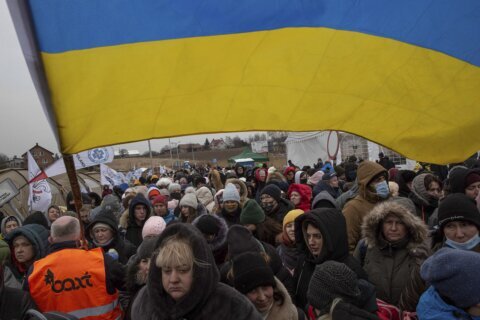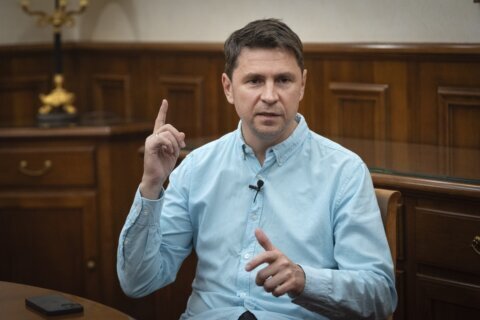It’s not a summer heat wave that’s making European leaders and businesses sweat. It’s fear that Russia’s manipulation of natural gas supplies will lead to an economic and political crisis next winter. Or, in the worst case, even sooner if Russia suddenly cuts off the gas.
Here are key things to know about the energy pressure game over the war in Ukraine:
WHAT’S HAPPENED?
European Commission President Ursula von der Leyen warned Wednesday that countries and industry need to be ready in case Russia completely cuts off already limited natural gas supplies. Fears are growing that the Nord Stream 1 pipeline from Russia to Germany under the Baltic Sea will not restart after a scheduled maintenance shutdown later this month.
Russia has already reduced gas supplies to a dozen EU countries, including Germany, the 27-country bloc’s biggest economy, that heavily depend on energy from Russia to generate electricity and to power their industries. The cutback has led to accusations from business and political leaders that Russia is punishing Europe for its support of Ukraine, which Russia invaded four months ago.
Russian state-owned energy giant Gazprom has reduced supplies through the Nord Stream 1 pipeline running under the Baltic Sea from Russia to Germany — Europe’s major natural gas pipeline — by 60%. Supplies to Italy have been cut by half. Germany relies on Russia for 35% of its gas imports; Italy for 40%.
WHY ARE THE REDUCTIONS A CONCERN?
Europe is scrambling to fill its underground gas storage ahead of the winter. Gas utilities fill reserves over the summer when, hopefully, they can buy less expensive gas and then draw from those reserves over the winter as heating demand rises. The current reductions will make refilling storage more difficult and expensive.
Diminishing energy supplies has brought closer the specter of a complete Russian gas shutoff that would make it impossible for Europe to get all the fuel it needs for next winter. Natural gas is used by several energy-intensive industries that are already facing higher costs and dialing back consumption, which has contributed to a slowing European economy.
Right now, Europe’s underground storage caverns are 60% full. The European Commission’s latest proposal is for each country to reach 80% by Nov. 1.
Economists Holger Schmieding and Salomon Fiedler at Berenberg bank say that if Russian does not resume deliveries through Nord Stream 1 after July 24, the EU “would likely be running on empty at the end of winter. To be on the safe side, some rationing of gas would likely set in beforehand.”
On top of all that, an explosion and fire at an export terminal in Freeport, Texas, took a fifth of U.S. export capacity offline for months sending another shudder through the gas market. Most of the terminal’s exports were going to Europe, Rystad Energy said.
WHAT’S BEING DONE?
The EU, which before the war got some 40% of its gas from Russia, has outlined plans to cut imports by two-thirds by year’s end and phase out Russian gas entirely by 2027. The bloc has already said it will block Russian coal starting in August and most Russian oil in six months. The goal is to reduce the $850 million per day Russia was been reaping from oil and gas sales to Europe before the start of the war.
To compensate for reduced Russian supplies, European governments and utilities have bought expensive liquefied natural gas, or LNG, from the United States that is delivered by ship, as opposed to gas that comes by pipeline from Russia and is typically cheaper. But the war has driven energy prices higher, fueling record inflation in Europe and helping to maintain a steady revenue stream for Russia.
There are efforts to get more pipeline gas from Norway and Azerbaijan, while the accelerated rollout of renewable energy and conservation are expected to play smaller roles. Germany, which has no LNG import terminals, is bringing in four floating terminals, two of which should be operating this year.
Despite a focus on renewable energy, the crisis is pushing countries back to fossil fuels. Germany is rushing through legislation to restart coal-fired power plants as a temporary measure despite plans to exit coal entirely by 2030. Officials have also urged Germans to conserve energy.
The Dutch government says it will allow coal-fired power stations to operate at full capacity again to conserve natural gas that would otherwise be burned to produce electricity.
Europe’s gas security is fragile despite all those measures. Liquefied gas export terminals in energy-producing countries like the U.S. and Qatar are running at full speed, meaning Europe is bidding against Asia for finite supplies.
On Wednesday, the European Parliament approved a proposal to define natural gas as environmentally sustainable energy, dismaying environmentalists and making it easier for private investors to inject money into gas-related projects.
WHAT’S RUSSIA’S GAME?
Gazprom says it had to cut back the flows to Europe through Nord Stream 1 because Western sanctions stranded a key piece of equipment in Canada, where it had been taken for maintenance. European governments aren’t buying it and call the reductions political.
Gazprom’s steps have sent natural gas prices sharply higher after they had fallen in the wake of the winter heating season. That increases revenue for Russia at a time when it’s under pressure from Western economic sanctions and adds to stress on Europe as it gives Ukraine political and military support.
Gazprom’s maneuvers also can be seen as pushback against Western sanctions and as a deterrent to imposing further penalties. And bigger gas users have been put on notice that, just like smaller ones, they are not exempt from a possible cutoff.
Germany and Italy saw their supplies cut around the time their leaders joined French President Emmanuel Macron in Kyiv to meet President Volodymyr Zelenskyy and back EU candidate status for Ukraine.
“Cutting Nord Stream 1 flows to Europe seems clearly an effort by Putin to stall Europe’s efforts to build gas stocks through the summer, ready presumably for another installment in the European energy wars this winter,” said Tim Ash, senior emerging markets sovereign strategist at BlueBay Asset Management.
WILL EUROPEANS SEE THE LIGHTS GO OUT OR FREEZE THIS WINTER?
That is unlikely because EU law mandates that governments ration gas supplies to industry so that homes, schools and hospitals are spared. Countries that run short of gas also can ask for help from others that may be in better shape, though that depends on adequate pipeline connections.
The downside of rationing would be industrial cutbacks and shutdowns that could cost jobs and growth in an economy that is already squeezed by high inflation and could be headed for a recession.
Meanwhile, a complete cutoff could send already high gas prices soaring toward their record of 206 euros ($217) per megawatt hour from March 7, further fueling inflation. At the start of 2021, before Russia massed troops on the border with Ukraine, spot gas cost about 19 euros per megawatt hour.
Copyright © 2024 The Associated Press. All rights reserved. This material may not be published, broadcast, written or redistributed.






